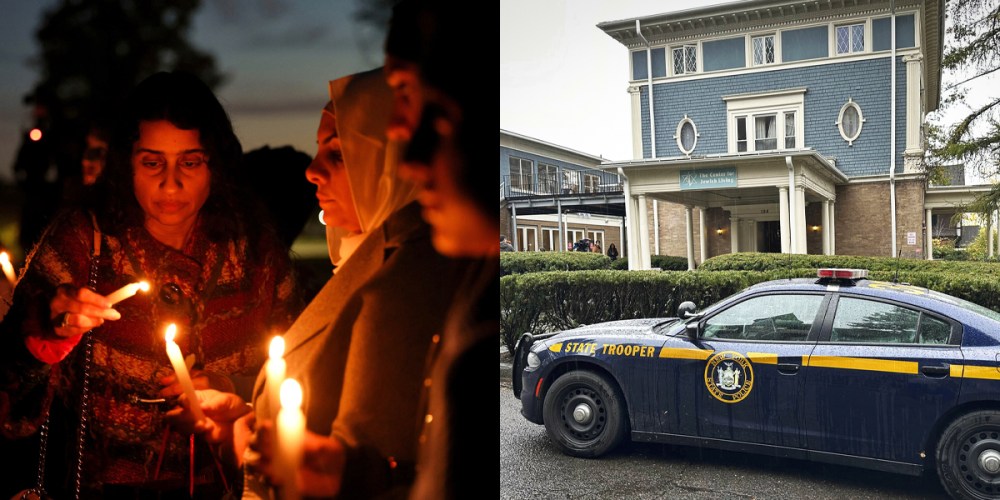My Palestinian father was born in the small village of Battir in the 1930s in what was then the British mandate of Palestine. He came to the United States as a refugee in his early 20s and would always tell me: “We can’t bring the Middle East conflict to the United States.” By that, he did not mean that we should ignore the conflict. I can assure you that we had endless energetic conversations about the geopolitics of the region — especially when my Palestinian cousins visited. What he meant was that the violence and anger of that region should not be expressed here on our soil.
My father, who was born in the West Bank, before it became occupied, and came to the U.S. as a refugee, would always tell me: “We can’t bring the Middle East conflict to the United States.”
But heartbreakingly that is what we are seeing play out now after the outbreak of war between Israel and Hamas. Since the brutal terrorist attack by Hamas on Oct. 7 that killed approximately 1,400 Israelis — including children — and Israel’s subsequent military response that has killed thousands of Palestinians in Gaza — including children — there’s been a startling increase in antisemitic, anti-Muslim and anti-Arab bigotry here in the U.S.
The Council on American-Islamic Relations (CAIR) said last week that, since Oct. 7, it had received nearly 800 complaints of incidents of hate directed against Muslims driven by bias against Palestinians and Arabs. CAIR measures that as the highest level of hate since 2015. At the same time, the Anti-Defamation League has reported a nearly 400% spike in antisemitic incidents in the U.S. since the Hamas attack.
Among the alarming examples of antisemitic hate are the defacing of Jewish synagogues with hateful language and threats against Jewish students on college campuses. A particularly jarring incident at Cornell University included threats to “shoot up” and stab Jews on the campus that led to the arrest Tuesday of a 21-year-old student.

In recent weeks, Muslim American college students wearing hijabs speak of being harassed, and Arab Americans have reported increased discrimination. In New York City, two men waving Israeli flags were arrested after police say they jumped out of their cars screaming anti-Palestinian comments and assaulted young Arab Americans walking on a Brooklyn sidewalk.
But the most heartbreaking and horrific incident happened on Oct. 14, a week after the Hamas attack, when police say a 71-year-old white man who had spewed anti-Muslim and anti-Palestinian hate killed Wadea Al-Fayoume, a 6-year-old Palestinian boy, by stabbing him 26 times. Police say the boy’s mother, Hanaan Shahin, who was stabbed a dozen times, was renting a ground-floor apartment from the suspect. The suspect’s wife reportedly told police that her husband “listens to conservative talk radio on a regular basis” and became obsessed with the war between Hamas and Israel. According to text messages Shanin sent the boy’s father, the suspect yelled during the attack: “You are killing our kids in Israel. You Palestinians don’t deserve to live.” (The suspect has pleaded not guilty.)
For Arab and Muslim Americans, the backlash is reminiscent of the months after 9/11 when hate and physical attacks directed against our community skyrocketed.

This should not be the daily life for Muslims, Jews or Arab Americans of any faith. Yet, given the testimony Tuesday of FBI Director Christopher Wray before the Senate, the future is even more worrisome for all three groups. Wray shared his concern that some people here may “draw inspiration from the events in the Middle East to carry out attacks against Americans going about their daily lives” and that could lead to “domestic violent extremists targeting Jewish or Muslim communities.”
Some of the bigotry being directed against these communities, as experts have noted, are from bigots who will exploit the Middle East conflict to justify their hatred of Jews or Muslims. In fact, even before the current war began in October, there was already an appalling spike in antisemitic incidents in our country. According to the Anti-Defamation League, 2022 had the highest number of antisemitic incidents in the United States since the organization began keeping track in 1979.
There’s no denying that the current conflict has done exactly what my father warned against.
There’s no denying that the current conflict has done exactly what my father warned against: that is, bringing the ugliness of the Middle East conflict to U.S. soil. And as media reports convey, some of that hate is from people who believe they are helping to win support for their cause.













